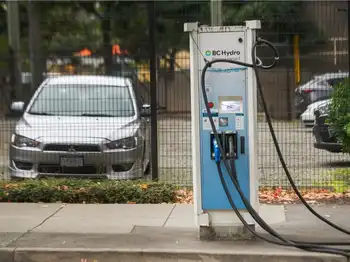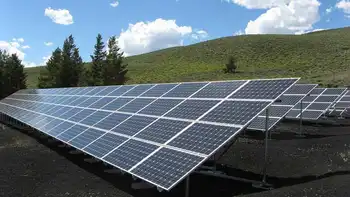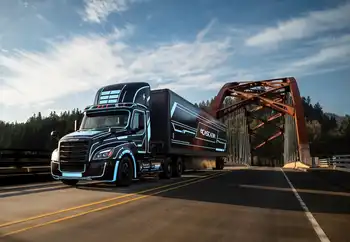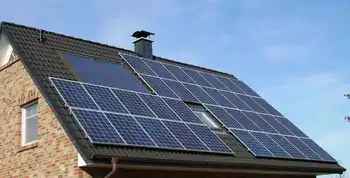Cascadia electrification accelerates renewable energy with wind and solar, EVs, heat pumps, and grid upgrades across British Columbia, Washington, and Oregon to decarbonize power, buildings, and transport at lower cost while creating jobs.
Key Points
Cascadia electrification is the shift to renewable grids, EVs, and heat pumps replacing fossil fuels.
✅ Wind and solar scale fast; gas and coal phase down
✅ EVs and heat pumps cut fuel costs and emissions
✅ Requires grid upgrades, policy, and social acceptance
Fifty years ago, a gasoline company’s TV ads showed an aging wooden windmill. As the wind died, it slowed to stillness. The ad asked: “But what do you do when the wind stops?” For the next several decades, fossil fuel providers and big utilities continued to denigrate renewable energy. Even the U.S. Energy Department deemed renewables “too rare, too diffuse, too distant, too uncertain and too ill-timed” to meaningfully contribute, as a top agency analyst put it in 2005.
Today we know that’s not true, especially in British Columbia, Washington and Oregon.
New research shows we could be collectively poised to pioneer a climate-friendly energy future for the globe — that renewable electricity can not only move Cascadia off of fossil fuels, but do so at an affordable price while creating some jobs along the way.
After decades of disinformation, this may sound like a wishful vision. But building a cleaner and more equitable economy — and doing so in just a few decades to head off the worst effects of climate change — is backed by a growing body of regional and international research.
Getting off fossil fuels is “feasible, necessary… and not very expensive” when compared to the earnings of the overall economy, said Jeffrey Sachs, an economist and global development expert at Columbia University.
Much of the confidence about the price tag comes down to this: Innovation and mass production have made wind and solar power installations cheaper than most fossil-fuelled power plants and today’s fastest-growing source of energy worldwide. The key to moving Cascadia’s economies away from fossil fuels, according to the latest research, is building more, prompting power companies to invest in carbon-free electricity as our go-to “fuel.”
However, doing that in time to help head off a cascading climatic crisis by mid-century means the region must take major steps in the next decade to speed the transition, researchers say. And that will require social buy-in.
The new research highlights three mutually supporting strategies that squeeze out fossil fuels:
Chefs and foodies are well-known fans of natural gas. Why, “Cooking with gas” is an expression for a reason. But one trendy Seattle restaurant-bar is getting by just fine with a climate-friendly alternative: electric induction cooktops.
Induction “burners” are just as controllable as gas burners and even faster to heat and cool, but produce less excess heat and zero air pollution. That made a huge difference to chef Stuart Lane’s predecessors when they launched Seattle cocktail bar Artusi 10 years ago.
Using induction meant they could squeeze more tables into the tight space available next door to Cascina Spinasse — their popular Italian restaurant in Seattle’s vibrant Capitol Hill neighborhood — and lowered the cost of expanding.
Rather than igniting a fossil fuel to roast the surface of pots and pans, induction burners generate a magnetic field that heats metal cookware from inside. For people at home, forgoing gas eliminates combustion by-products, which means fewer asthma attacks and other health impacts.
For Artusi, it eliminated the need for a pricey hood and fans to continuously pump fumes and heat out and pull fresh air in. That made induction the cheaper way to go, even though induction cooktops cost more than conventional gas ranges.
Over the years, they’ve expanded the menu because even guests who come for the signature Amari cocktails often stay for the handmade pasta, meatballs and seasonal sauces. So the initial pair of induction burners has multiplied to nine. Yet Artusi retains a cleaner, quieter and more intimate atmosphere. Yet thanks largely to the smaller fans, “it’s not as chaotic,” said Lane.
And Lane adds, it feels good to be cooking on electricity — which in Seattle proper is about 90 per cent renewable — rather than on a fossil fuel that produces climate-warming greenhouse gases. “You feel like you’re doing something right,” he said.
Lane says he wouldn’t be surprised if induction is the new normal for chefs entering the trade 10 years from now. “They probably would cook with gas and say, ‘Damn it’s hot in here!’” — Peter Fairley
This story is supported in part by a grant from the Fund for Investigative Journalism.
increasing energy efficiency to trim the amount of power we need,
boosting renewable energy to make it possible to turn off climate-wrecking fossil-fuel plants, and
plugging as much stuff as possible into the electrical grid.
Recent studies in B.C. and Washington state, and underway for Oregon, point to efficiency and electrification as the most cost-effective route to slashing emissions while maintaining lifestyles and maximizing jobs. A recent National Academies of Science study reached the same conclusion, calling electrification the core strategy for an equitable and economically advantageous energy transition, while abroad New Zealand's electrification push is asking whether electricity can replace fossil fuels in time.
However, technologies don’t emerge in a vacuum. The social and economic adjustments required by the wholesale shift from fossil fuels that belch climate-warming carbon emissions to renewable power can still make or break decarbonization, according to Jim Williams, a University of San Francisco energy expert whose simulation software tools have guided many national and regional energy plans, including two new U.S.-wide studies, a December 2020 analysis for Washington state and another in process for Oregon.
Williams points to vital actions that are liable to rile up those who lose money in the deal. Steps like letting trees grow many decades older before they are cut down, so they can suck up more carbon dioxide — which means forgoing quicker profits from selling timber. Or convincing rural communities and conservationists that they should accept power-transmission lines crossing farms and forests.
“It’s those kinds of policy questions and social acceptance questions that are the big challenges,” said Williams.
Washington, Oregon and B.C. already mandate growing supplies of renewable power and help cover the added cost of some electric equipment, and across the border efforts at cleaning up Canada's electricity are critical to meeting climate pledges. These include battery-powered cars, SUVs and pickups on the road. Heat pumps — air conditioners that run in reverse to push heat into a building — can replace furnaces. And, at industrial sites, electric machines can take the place of older mechanical systems, cutting costs and boosting reliability.
As these options drop in price they are weakening reliance on fossil fuels — even among professional chefs who’ve long sworn by cooking with gas (see sidebar: Cooking quick, clean and carbon-free).
“For each of the things that we enjoy and we need, there’s a pathway to do that without producing any greenhouse gas emissions,” said Jotham Peters, managing partner for Vancouver-based energy analysis firm Navius Research, whose clients include the B.C. government.
What the modelling tells us
Key to decarbonization planning for Cascadia are computer simulations of future conditions known as models. These projections take electrification and other options and run with them. Researchers run dozens of simulated potential future energy scenarios for a given region, tinkering with different variables: How much will energy demand grow? What happens if we can get 80 per cent of people into electric cars? What if it’s only 50 per cent? And so on.
Accelerating the transition requires large investments, this modelling shows. Plugging in millions of vehicles and heat pumps demands both brawnier and more flexible power systems, including more power lines and other infrastructure such as bridging the Alberta-B.C. electricity gap that communities often oppose. That demands both stronger policies and public acceptance. It means training and apprenticeships for the trades that must retrofit homes, and ensuring that all communities benefit — especially those disproportionately suffering from energy-related pollution in the fossil fuel era.
Consensus is imperative, but the new studies are bound to spark controversy. Because, while affordable, decarbonization is not free.
The Meikle Wind Project in BC’s Peace River region, the province’s largest, with 61 turbines producing 184.6 MW of electricity, went online in 2017. Photo: Pattern Development.
Projections for British Columbia and Washington suggest that decarbonizing Cascadia will spur extra job-stimulating growth. But the benefits and relatively low net cost mask a large swing in spending that will create winners and losers, and without policies to protect disadvantaged communities from potential energy cost increases, could leave some behind.
By 2030, the path to decarbonization shows Washingtonians buying about $5 billion less worth of natural gas, coal and petroleum products, while putting even more dollars toward cleaner vehicles and homes. No surprise then that oil and gas interests are attacking the new research.
And the research shows a likely economic speed bump around 2030. Economic growth would slow due to increased energy costs as economies race to make a sharp turn toward pollution reductions after nearly a decade of rising greenhouse gas emissions.
“Meeting that 2030 target is tough and I think it took everybody a little bit by surprise,” said Nancy Hirsh, executive director of the Seattle-based NW Energy Coalition, and co-chair of a state panel that shaped Washington’s recent energy supply planning.
But that’s not cause to ease up. Wait longer, says Hirsh, and the price will only rise.
Charging up
What most drives Cascadia’s energy models toward electrification is the dropping cost of renewable electricity.
Take solar energy. In 2010, no large power system in the world got more than three per cent of its electricity from solar. But over the past decade, solar energy’s cost fell more than 80 per cent, and by last year it was delivering over nine per cent of Germany’s electricity and over 19 per cent of California’s.
Government mandates and incentives helped get the trend started, and Canada's electricity progress underscores how costs continue to fall. Once prohibitively expensive, solar’s price now beats nuclear, coal and gas-fired power, and it’s expected to keep getting cheaper. The same goes for wind power, whose jumbo jet-sized composite blades bear no resemblance to the rickety machines once mocked by Big Oil.
In contrast, cleaning up gas- or coal-fired power plants by equipping them to capture their carbon pollution remains expensive even after decades of research and development and government incentives. Cost overruns and mechanical failures recently shuttered the world’s largest “low-carbon” coal-fired power plant in Texas after less than four years of operation.
Retrofits enabled this coal-fired plant in Texas to capture some of its carbon dioxide pollution, which was then injected into aging oil wells to revive production. But problems made the plant’s coal-fired power — which is being priced out by renewable energy — even less competitive and it was shut down after three years in 2020. Photo by NRG Energy.
Innovation and incentives are also making equipment that plugs into the grid cheaper. Electric options are good and getting better with a push from governments and a self-reinforcing cycle of performance improvement, mass production and increased demand.
Battery advances and cost cuts over the past decade have made owning an electric car cheaper, fuel included, than conventional cars. Electric heat pumps may be the next electric wave. They’re three to four times more efficient than electric baseboard heaters, save money over natural gas in most new homes, and work in Cascadia’s coldest zones.
Merran Smith, executive director of the Vancouver-based non-profit Clean Energy Canada, says that — as with electric cars five years ago — people don’t realize how much heat pumps have improved. “Heat pumps used to be big huge noisy things,” said Smith. “Now they’re a fraction of the size, they’re quiet and efficient.”
Electrifying certain industrial processes can also cut greenhouse gases at low cost. Surprisingly, even oil and gas drilling rigs and pipeline compressors can be converted to electric. Provincial utility BC Hydro is building new transmission lines to meet anticipated power demand from electrification of the fracking fields in northeastern British Columbia that supply much of Cascadia’s natural gas.
Simulating low-carbon living
The computer simulation tools guiding energy and climate strategies, unlike previous models that looked at individual sectors, take an economy-wide view. Planners can repeatedly run scenarios through sophisticated software, tinkering with their assumptions each time to answer cross-cutting questions such as: Should the limited supply of waste wood from forestry that can be sustainably removed from forests be burned in power plants? Or is it more valuable converted to biofuel for airplanes that can’t plug into the grid?
Evolved Energy Research, a San Francisco-based firm, analyzed the situation in Washington. Its algorithms are tuned using data about energy production and use today — down to the number and types of furnaces, stovetops or vehicles. It has expert assessments of future costs for equipment and fuels. And it knows the state’s mandated emissions targets.
Researchers run the model myriad times, simulating decisions about equipment and fuel purchases — such as whether restaurants stick with gas or switch to electric induction “burners” as their gas stoves wear out. The model finds the most cost-effective choices by homes and businesses that meet the state’s climate goals.
For Seattle wine bar Artusi, going with electric induction cooktops meant they could squeeze more tables into a tight, comfortable space. Standard burners cost less but would have required noisy, pricey fume hoods and fans to suck out the pollutants. For more, see sidebar. Photo: InvestigateWest.
Rather than accepting that optimal scenario and calling it a day, modellers account for uncertainty in their estimates of future costs by throwing in various additional constraints and rerunning the model.
That probing shows that longer reliance on climate-warming natural gas and petroleum fuels increases costs. In fact, all of the climate-protecting scenarios achieve Washington’s goals at relatively low cost, compared to the state’s historic spending on energy.
The end result of these scenarios are net-zero carbon emissions in 2050, echoing Canada's race to net-zero and the growing role of renewable energy, in which a small amount of emissions remaining are offset by rebounding forests or equipment that scrubs CO2 from the air.
But the seeds of that transformation must be sown by 2030. The scenarios identify common strategies that the state can pursue with low risk of future regrets.
One no brainer is to rapidly add wind and solar power to wring out CO2 emissions from Washington’s power sector. The projections end coal-fired power by 2025, as required by law, but also show that, with grid upgrades, gas-fired power plants that produce greenhouse gas emissions can stay turned off most of the time. That delivers about 16.2 million of the 44.8 million metric tons of CO2 emissions cut required by 2030 under state law.
All of the Washington scenarios also jack up electricity consumption to power cars and heating. By 2050, Washington homes and businesses would draw more than twice as much power from the grid as they did last year, meaning climate-friendly electricity is displacing climate-unfriendly gasoline, diesel fuel and natural gas. In the optimal case, electricity meets 98 per cent of transport energy in 2050, and over 80 per cent of building energy use.
By 2050, the high-electrification scenarios would create over 60,000 extra jobs across the state, as replacing old and inefficient equipment and construction of renewable power plants stimulates economic growth, according to projections from Washington, D.C.-based FTI Consulting. Scenarios with less electrification require more low-carbon fuels that cut emissions at higher cost, and thus create 15,000 to 35,000 fewer jobs.
Much of the new employment comes in middle-class positions — including about half of the total in construction — leading to big boosts in employment income. Washingtonians earn over $7 billion more in 2050 under the high-electrification scenarios, compared to a little over $5 billion if buildings stick with gas heating through 2050 and less than $2 billion with extra transportation fuels.
Rocketing to 2030
Evolved Energy’s electrification-heavy decarbonization pathways for Washington dovetail with a growing body of international research, such as that National Academy of Sciences report and a major U.S. decarbonization study led by Princeton University, and in Canada debates like Elizabeth May's 2030 renewable grid goal are testing feasibility. (See Grist’s 100 per cent Clean Energy video for a popularized view of similar pathways to slash U.S. carbon emissions, informed by Princeton modeller Jesse Jenkins.)
Related News













